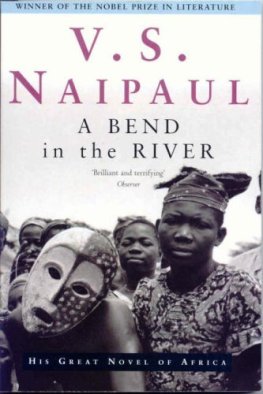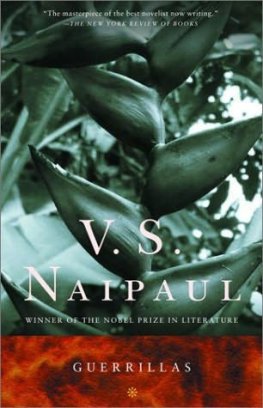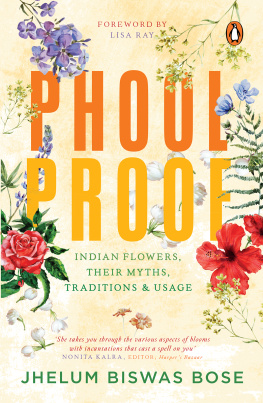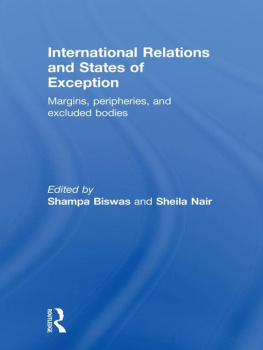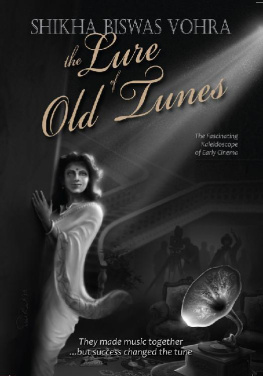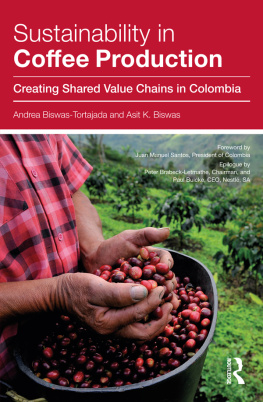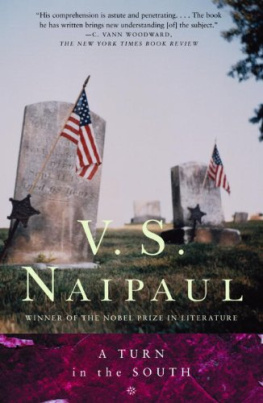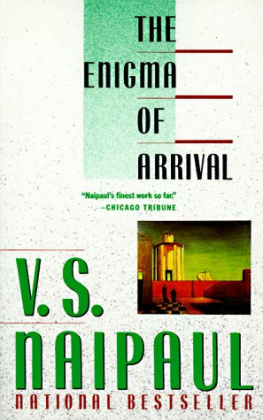V. S. Naipaul - A House for Mr. Biswas
Here you can read online V. S. Naipaul - A House for Mr. Biswas full text of the book (entire story) in english for free. Download pdf and epub, get meaning, cover and reviews about this ebook. year: 2001, publisher: Knopf Doubleday Publishing Group, genre: Detective and thriller. Description of the work, (preface) as well as reviews are available. Best literature library LitArk.com created for fans of good reading and offers a wide selection of genres:
Romance novel
Science fiction
Adventure
Detective
Science
History
Home and family
Prose
Art
Politics
Computer
Non-fiction
Religion
Business
Children
Humor
Choose a favorite category and find really read worthwhile books. Enjoy immersion in the world of imagination, feel the emotions of the characters or learn something new for yourself, make an fascinating discovery.

- Book:A House for Mr. Biswas
- Author:
- Publisher:Knopf Doubleday Publishing Group
- Genre:
- Year:2001
- Rating:5 / 5
- Favourites:Add to favourites
- Your mark:
- 100
- 1
- 2
- 3
- 4
- 5
A House for Mr. Biswas : summary, description and annotation
We offer to read an annotation, description, summary or preface (depends on what the author of the book "A House for Mr. Biswas " wrote himself). If you haven't found the necessary information about the book — write in the comments, we will try to find it.
A House for Mr. Biswas — read online for free the complete book (whole text) full work
Below is the text of the book, divided by pages. System saving the place of the last page read, allows you to conveniently read the book "A House for Mr. Biswas " online for free, without having to search again every time where you left off. Put a bookmark, and you can go to the page where you finished reading at any time.
Font size:
Interval:
Bookmark:
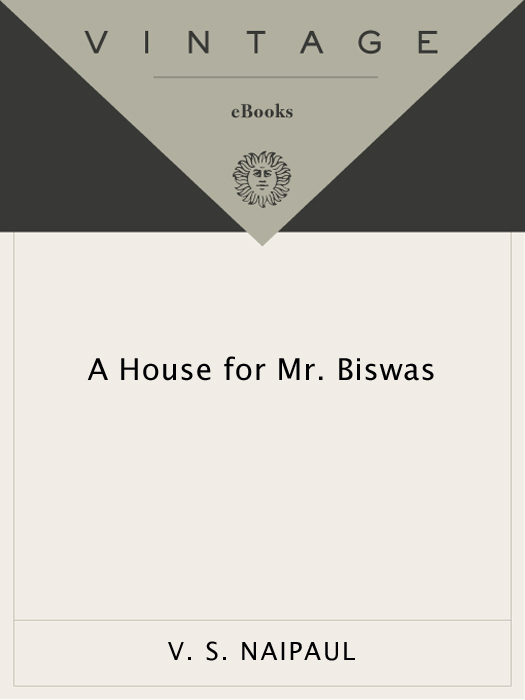
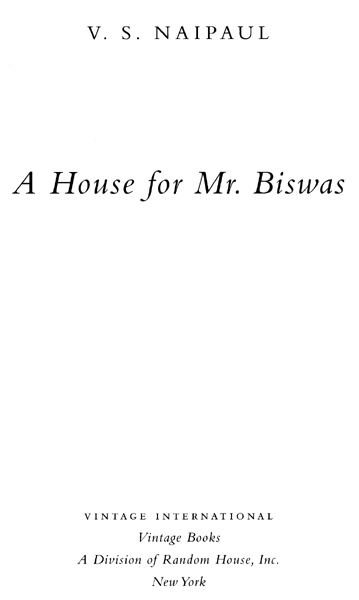

FIRST VINTAGE INTERNATIONAL EDITION, MARCH 2001
Copyright 1961, 1969, copyright renewed 1989 by V.S. Naipaul
All rights reserved under International and Pan-American Copyright Conventions. Published in the United States by Vintage Books, a division of Random House, Inc., New York. Originally published in hardcover in the United States by Alfred A. Knopf, a division of Random House, Inc., New York, in 1961.
Vintage is a registered trademark and Vintage International and colophon are trademarks of Random House, Inc.
Library of Congress Cataloging-in-Publication Data
Naipaul, V. S. (Vidiadhar Surajprasad), 1932
A house for Mr. Biswas / V. S. Naipaul1st Vintage Books ed.
p. cm.
1. East IndiansTrinidad and TobagoFiction.
2. Port of Spain (Trinidad and Tobago)Fiction.
3. Middle aged menFiction. 4. Home ownershipFiction.
5. HomeownersFiction.
I. Title: House for Mister Biswas. II. Title.
PR9272.9.N32 H6 2001
823.914dc21 00-049056
eISBN: 978-0-307-77655-6
www.vintagebooks.com
v3.1
V. S. Naipaul was born in Trinidad in 1932. He went to England on a scholarship in 1950. After four years at Oxford he began to write, and since then he has followed no other profession. He is the author of more than twenty books of fiction and nonfiction and the recipient of numerous honors, including the Booker Prize in 1971 and a knighthood for services to literature in 1990. He lives in Wiltshire, England.

NONFICTION
Between Father and Son: Family Letters
Beyond Belief: Islamic Excursions Among the Converted Peoples
India: A Million Mutinies Now
A Turn in the South
Finding the Center
Among the Believers
The Return of Eva Pern (with The Killings in Trinidad)
India: A Wounded Civilization
The Overcrowded Barracoon
The Loss of El Dorado
An Area of Darkness
The Middle Passage
FICTION
A Way in the World
The Enigma of Arrival
A Bend in the River
Guerrillas
In a Free State
A Flag on the Island
The Mimic Men
Mr. Stone and the Knights Companion
Miguel Street*
The Suffrage of Elvira*
The Mystic Masseur*
*Published in an omnibus edition entitled Three Novels
TEN WEEKS before he died, Mr Mohun Biswas, a journalist of Sikkim Street, St James, Port of Spain, was sacked. He had been ill for some time. In less than a year he had spent more than nine weeks at the Colonial Hospital and convalesced at home for even longer. When the doctor advised him to take a complete rest the Trinidad Sentinel had no choice. It gave Mr Biswas three months notice and continued, up to the time of his death, to supply him every morning with a free copy of the paper.
Mr Biswas was forty-six, and had four children. He had no money. His wife Shama had no money. On the house in Sikkim Street Mr Biswas owed, and had been owing for four years, three thousand dollars. The interest on this, at eight per cent, came to twenty dollars a month; the ground rent was ten dollars. Two children were at school. The two older children, on whom Mr Biswas might have depended, were both abroad on scholarships.
It gave Mr Biswas some satisfaction that in the circumstances Shama did not run straight off to her mother to beg for help. Ten years before that would have been her first thought. Now she tried to comfort Mr Biswas, and devised plans on her own.
Potatoes, she said. We can start selling potatoes. The price around here is eight cents a pound. If we buy at five and sell at seven
Trust the Tulsi bad blood, Mr Biswas said. I know that the pack of you Tulsis are financial geniuses. But have a good look around and count the number of people selling potatoes. Better to sell the old car.
No. Not the car. Dont worry. Well manage.
Yes, Mr Biswas said irritably. Well manage.
No more was heard of the potatoes, and Mr Biswas never threatened again to sell the car. He didnt now care to do anything against his wifes wishes. He had grown to accept her judgement and to respect her optimism. He trusted her. Since they had moved to the house Shama had learned a new loyalty, to him and to their children; away from her mother and sisters, she was able to express this without shame, and to Mr Biswas this was a triumph almost as big as the acquiring of his own house.
He thought of the house as his own, though for years it had been irretrievably mortgaged. And during these months of illness and despair he was struck again and again by the wonder of being in his own house, the audacity of it: to walk in through his own front gate, to bar entry to whoever he wished, to close his doors and windows every night, to hear no noises except those of his family, to wander freely from room to room and about his yard, instead of being condemned, as before, to retire the moment he got home to the crowded room in one or the other of Mrs Tulsis houses, crowded with Shamas sisters, their husbands, their children. As a boy he had moved from one house of strangers to another; and since his marriage he felt he had lived nowhere but in the houses of the Tulsis, at Hanuman House in Arwacas, in the decaying wooden house at Shorthills, in the clumsy concrete house in Port of Spain. And now at the end he found himself in his own house, on his own half-lot of land, his own portion of the earth. That he should have been responsible for this seemed to him, in these last months, stupendous.
The house could be seen from two or three streets away and was known all over St James. It was like a huge and squat sentry-box: tall, square, two-storeyed, with a pyramidal roof of corrugated iron. It had been designed and built by a solicitors clerk who built houses in his spare time. The solicitors clerk had many contacts. He bought land which the City Council had announced was not for sale; he persuaded estate owners to split whole lots into half-lots; he bought lots of barely reclaimed swamp land near Mucurapo and got permission to build on them. On whole lots or three-quarter-lots he built one-storey houses, twenty feet by twenty-six, which could pass unnoticed; on half-lots he built two-storey houses, twenty feet by thirteen, which were distinctive. All his houses were assembled mainly from frames from the dismantled American Army camps at Docksite, Pompeii Savannah and Fort Read. The frames did not always match, but they enabled the solicitors clerk to pursue his hobby with little professional help.
On the ground floor of Mr Biswass two-storey house the solicitors clerk had put a tiny kitchen in one corner; the remaining L-shaped space, unbroken, served as drawingroom and diningroom. Between the kitchen and the diningroom there was a doorway but no door. Upstairs, just above the kitchen, the clerk had constructed a concrete room which contained a toilet bowl, a wash-basin and a shower; because of the shower this room was perpetually wet. The remaining L-shaped space was broken up into a bedroom, a verandah, a bedroom. Because the house faced west and had no protection from the sun, in the afternoon only two rooms were comfortably habitable: the kitchen downstairs and the wet bathroom-and-lavatory upstairs.
Font size:
Interval:
Bookmark:
Similar books «A House for Mr. Biswas »
Look at similar books to A House for Mr. Biswas . We have selected literature similar in name and meaning in the hope of providing readers with more options to find new, interesting, not yet read works.
Discussion, reviews of the book A House for Mr. Biswas and just readers' own opinions. Leave your comments, write what you think about the work, its meaning or the main characters. Specify what exactly you liked and what you didn't like, and why you think so.

